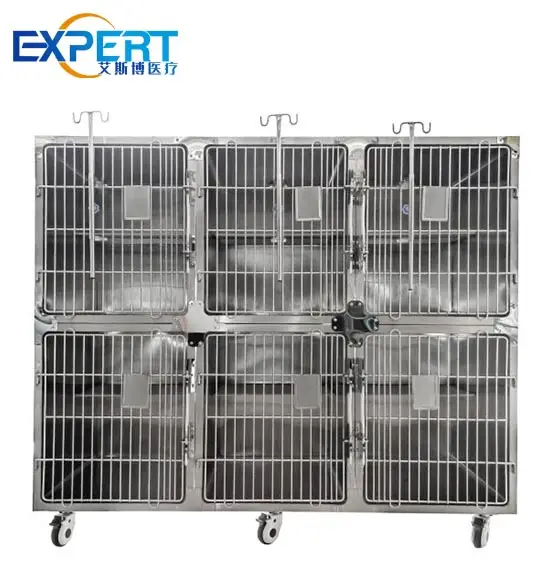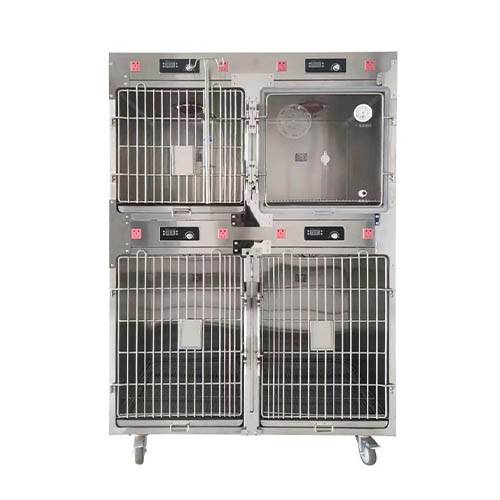Endereço
304 North Cardinal St.
Dorchester Center, MA 02124
Horas de trabalho
Segunda a sexta: 7h00 - 19h00
Fim de semana: 10h - 17h
Animal safety is a paramount concern in veterinary clinics, hospitals, and shelters. Ensuring that animals are housed in a secure, clean, and comfortable environment is crucial for their well-being and recovery. Veterinary stainless steel cages have become the standard for animal enclosures due to their durability, hygiene, and safety features. This comprehensive guide will explore how veterinary stainless steel cages enhance animal safety, examining their benefits, key features, maintenance practices, and more. By the end of this article, you will have a thorough understanding of why veterinary stainless steel cages are essential for any animal care facility.

One of the primary reasons veterinary stainless steel cages are favored in animal care facilities is their durability. Stainless steel is known for its strength and resistance to corrosion, making it an ideal material for cages that need to withstand the test of time. This durability ensures that the cages can endure the daily wear and tear of an active veterinary clinic, providing a long-lasting solution for housing animals.
Maintaining a clean environment is crucial in preventing the spread of diseases and infections in animal care facilities. Veterinary stainless steel cages are easy to clean and disinfect, making them the preferred choice for ensuring a hygienic environment. Unlike cages made of other materials, stainless steel does not harbor bacteria, fungi, or viruses, reducing the risk of contamination.
Animal comfort is another critical aspect of veterinary care. Veterinary stainless steel cages are designed to provide a comfortable and safe environment for animals. These cages come in various sizes and designs, allowing veterinarians to choose the best option for different types of animals. The smooth surfaces and lack of sharp edges also ensure that animals do not get injured while moving around in the cage.






Safety is a top priority in any veterinary setting. Veterinary stainless steel cages are equipped with secure locking mechanisms to prevent animals from escaping. These locks are designed to be tamper-proof, ensuring that even the most clever animals cannot open the cages on their own.
To further enhance safety, veterinary stainless steel cages are designed with rounded edges and corners. This design feature prevents injuries to both animals and staff. Sharp edges can cause cuts and other injuries, so the rounded design is a critical aspect of animal safety.

Maintaining the cleanliness of veterinary stainless steel cages is essential for animal safety and health. Regular cleaning and disinfection help prevent the spread of diseases and ensure a safe environment for animals.
Regular inspection and maintenance of veterinary stainless steel cages are necessary to ensure their longevity and safety. Look for any signs of damage, such as loose hinges or broken locks, and repair them promptly.
| Recurso | Stainless Steel Cages | Plastic Cages | Wooden Cages |
|---|---|---|---|
| Durabilidade | Alto | Moderado | Baixo |
| Higiene | Excelente | Bom | Pobre |
| Manutenção | Fácil | Moderado | Difficult |
| Segurança | Alto | Moderado | Baixo |
| Longevidade | Duradouro | Moderado | Short-lived |
| Custo | Higher initial investment | Moderado | Lower initial investment |
Veterinary stainless steel cages are an indispensable part of any animal care facility. Their durability, hygiene, and safety features make them the ideal choice for housing animals in veterinary clinics, hospitals, and shelters. By providing a secure and comfortable environment, these cages play a crucial role in enhancing animal safety and well-being. Regular maintenance and proper use of these cages will ensure they continue to serve their purpose effectively for many years.
Veterinary stainless steel cages are preferred due to their durability, ease of cleaning, and superior hygiene. Stainless steel does not rust or harbor bacteria, making it an ideal material for maintaining a safe and clean environment for animals.
Stainless steel cages enhance animal safety through their strong construction, secure locking mechanisms, and smooth, rounded edges. These features prevent injuries and ensure that animals cannot escape or harm themselves while housed in the cages.
Regular cleaning and disinfection are essential to maintain veterinary stainless steel cages. Additionally, periodic inspections and maintenance of locking mechanisms and hinges are necessary to ensure the cages remain in good working condition.
Yes, veterinary stainless steel cages come in various sizes and designs to accommodate different types of animals, from small pets to larger animals. Their versatility makes them suitable for a wide range of veterinary applications.
While the initial cost of stainless steel cages may be higher than other materials, their durability, longevity, and low maintenance requirements make them a cost-effective investment in the long run. The enhanced safety and hygiene they provide are invaluable in a veterinary setting.
